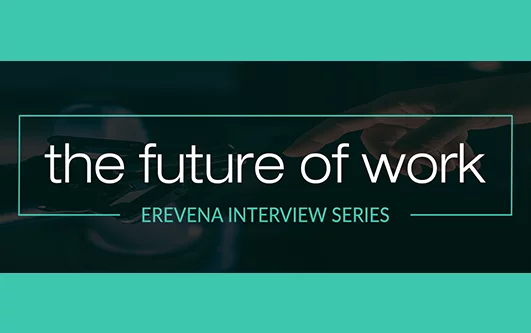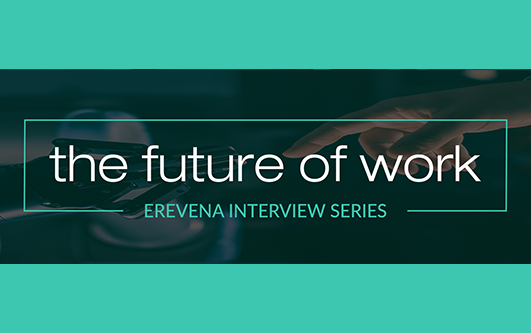Madeleine Evans, CEO and Founder at Levell is on a mission to make the employee experience in work as simple, easy and efficient – and personal – as expected of today’s consumer experience. She talks to Hazel Mulhare, Partner at Erevena about her views on the future of work, and how Levell is flipping the traditional approach to HR technology, , incorporating key insights from occupational health research, to help employees thrive in our new world of mobile-first, distributed post-lockdown work.
How do you define the future of work?
Prior to Covid-19, our system of work was already broken.
According to research we carried out in 2018 with Streetbees, 60% of UK workers were regularly coming to work feeling exhausted or stressed, with 30-40% burning out and/or struggling with work-life balance. This was a predictable result of the broad expansion of information and communication technology (enabling always-on work); an increase in the service sector’s share of GDP (whereby interpersonal interactions increased; increasing emotional demands); decreasing workforce share in corporate financial returns (limiting the ability to pay for extra at-home support); and an economy fundamentally defined by market-based competition for scarce resources.
These forces have combined to create an entirely unhealthy environment for work. Due to the negative externalities of stress and fatigue on creativity, task performance and engagement in work – and despite the increasing availability of ‘productivity’ apps – over the last decade human capital productivity in terms of output per hour has stagnated.
Interestingly, decades of academic research into the causes of burnout and engagement in work (from the occupational health psychology domain) have a very clear fix. This research points to a shortlist of changes to the structures and dynamics of work that will reduce companies’ absenteeism and presenteeism costs and unlock health and productivity for employees. For example, at the top of this list is increasing employee job control, which is defined by increasing decision latitude, improving voice and influence in work, and enabling schedule/location flexibility.
But change is hard, particularly when we are talking about structural and behavioural change, and even more so when that change requires cooperation between employers and employees. So prior to Covid-19, most employees (and employers!) were still stuck in a company-defined, one-size-fits-all approach to managing time and resources in work, predominantly on-site – and so bearing the costs in terms of increasing health problems, absences, and productivity.
If you would have asked me in January 2020, the future of work for both employees and employers (based on these trends and statistics) was looking pretty bleak!
In your view, how did this change with Covid-19?
Almost overnight, we reduced employers’ ability to oversee work. So, work environments, schedules, and cultures were by definition no longer one-size-fits-all. We also dramatically increased employees’ levels of job control – by virtue of being able to work from home without a commute and the same set schedule.
Although there is a scenario in which we migrate back to the pre-Covid office state, simply based on the overwhelming physical, mental and emotional benefits of giving workers more flexibility and reducing the time required to commute, this looks highly unlikely. So I believe that as a result of Covid-19 we will see a permanent shift to a system in which employees, especially in traditionally white-collar office-based cultures, have much greater control over when, how, and where they do their work than they did before.
Assuming the enterprise stays at least partially remote, what can we expect to see in terms of new technologies in the market?
As we have all seen, going remote significantly impacts how we connect, communicate about and collaborate to do work. So first off, we can expect a wave of startups catering to these shifts in communication needs and collaboration patterns. For example, the lockdown has been great for Microsoft Teams and Slack; we had a mass movement to Zoom, and then a scramble of startups launching virtual webinar and conference-hosting software. And now a wave of startups are trying to create virtual environments for more informal conversations such as water cooler chats or team socials.
So, if the first wave of technologies was focused on enabling basic within-team communication during work, the second wave of new technologies will be focused on enabling the more sophisticated processes of work and resource management to take place virtually. That means platforms that ensure employees can access everything they need (information, services, tools) to do their job well, while also enabling leaders to stay up to date on their workforce’s needs for support (impacting health, engagement and productivity) – without being on-site.
Tell us a little bit about your vision for our experience in work. Where are you focused with Levell?
Levell’s aims to fix the broken employee experience in a way that is designed specifically for our new world of work. Our mission is to make the employee experience in work as simple, easy, and efficient (and personal, of course), as expected of today’s consumer experience.
Currently, most enterprises have many systems for ensuring employees’ well-being, engagement, and efficiency in work. These comprise systems to monitor employees’ perceptions of work (surveys, feedback apps, staff forums, 121s etc.); to track the value employees add (goal management apps, project trackers or time-sheeting tools); and to provide enabling resource (online intranets, email campaigns, IT service desks, learning and development or health benefits platforms). Although this IT strategy might make sense when implemented with an incremental approach whereby each tool is purpose-built, designed to facilitate a new resource management need or administrative workflow when taken together the breadth of tools creates a terrible, disjointed employee experience.
Levell solves this problem by re-designing HR processes and products to be mobile-first (suitable for Millennials/Gen Z and remote work), maximise employee voice (including inquiring about how employees feel; so as to enable leaders to best support well-being in addition to productivity in work), and minimise practical daily frictions for employees. With Levell, employees can use one single app to check-in and feed back, access the various resources provided by their work, and monitor personal progress and state, anytime they want and straight from their mobile. This also includes a focus on key early predictors for burnout and engagement in work such as stress and motivation.
As a result, enterprise HR can reduce their administrative workflows and eliminate redundant systems. We provide anonymous dashboards for leaders that make the process of understanding trends about the well-being and productivity of their remote employee base much easier as well.
The Covid pandemic has finally created the trigger for enterprises to wake up to the opportunities of supporting flexible work. Levell makes it easy for an enterprise to maintain a culture of full or partial remote work in a way that also dramatically improves the employee experience, flipping the traditional scattered approach to HR technology to help humans thrive in our new world of mobile-first, distributed and changing work.
Share this article:













